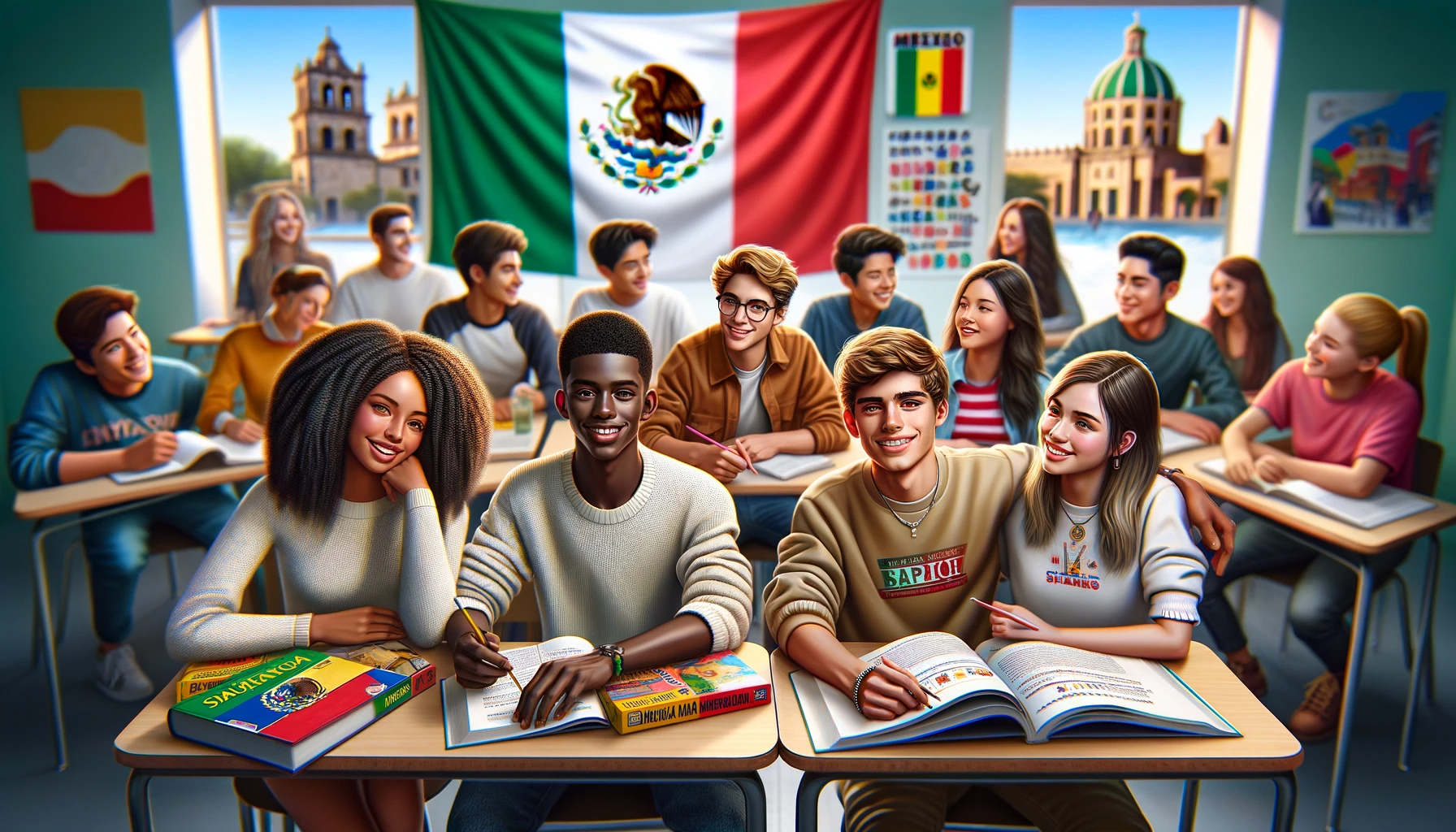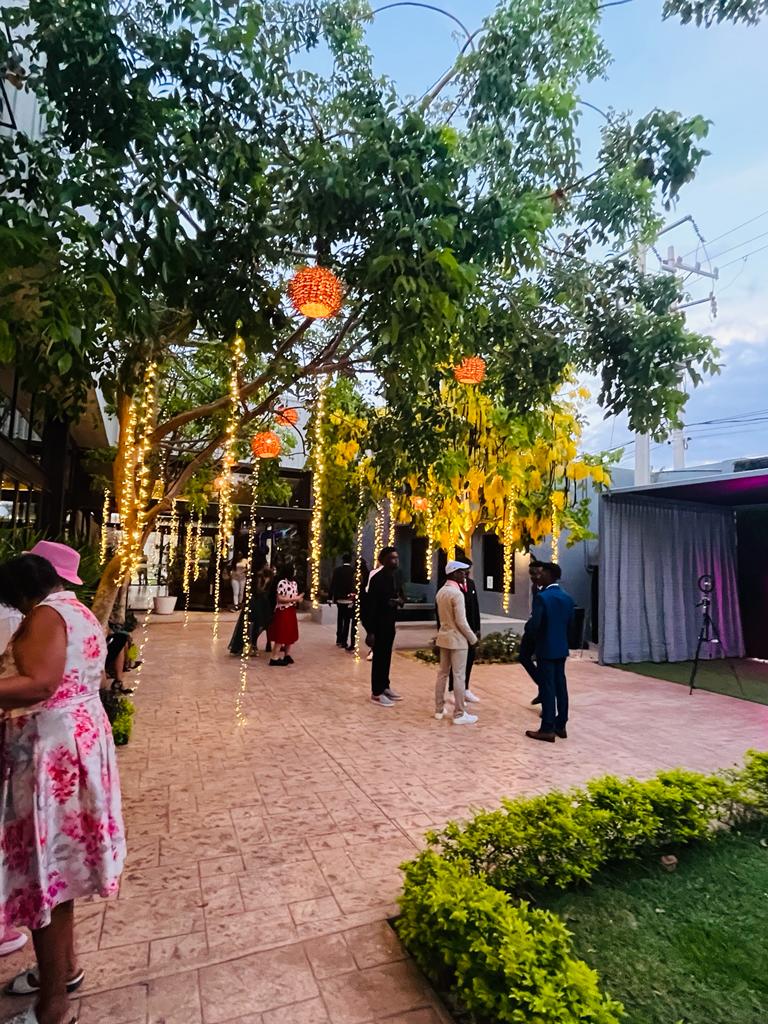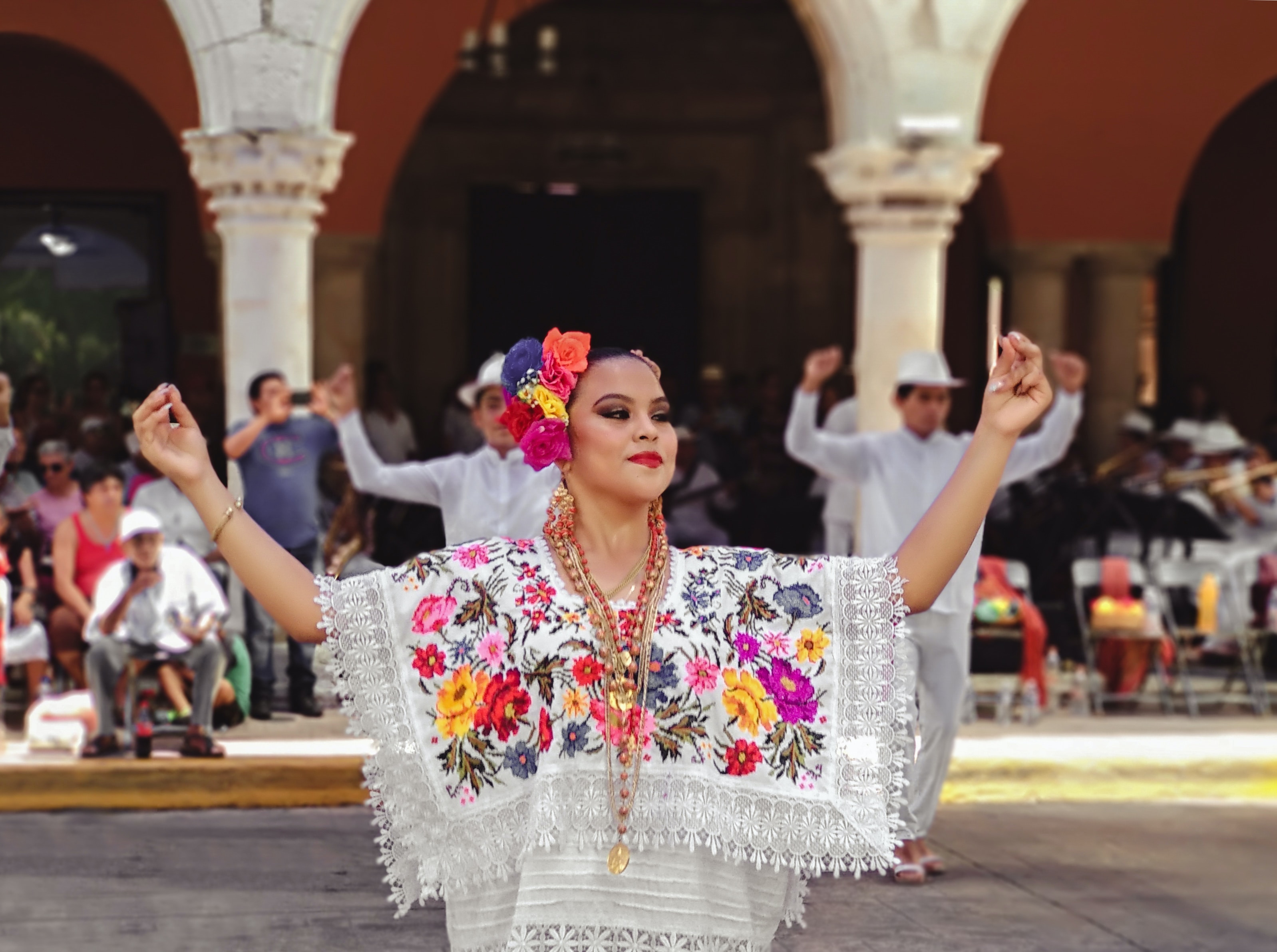Celebrating Pride: Stories and Wisdom from Our LGBTQIA+ Community
June is a rainbow of celebration, reflection, and community strength. It’s the time of the year we observe Pride Month, honoring the courage, struggle, and diversity within the LGBTQIA+ community. Here at Merida Teens Club, we believe in the importance of sharing narratives, in the power of stories that can educate, inspire, and bridge gaps of understanding.
This year, our team at Merida Teens Club noticed something concerning in our Yucatan area. While the month was filled with various Pride events, none seemed to be geared specifically towards teens. This left us wondering about our young community members who might be struggling with or navigating their identities, and about the supportive spaces they might need but find lacking.

That’s when our team decided to step up. We believe in the power of shared narratives – stories that can educate, inspire, and bridge gaps of understanding. So, we set out to gather insights from our own LGBTQIA+ community and create a platform for these crucial voices to be heard.
In this blog post, you’ll find heartfelt narratives from LGBTQIA+ adults, reflecting on their own experiences as teenagers. Their stories of struggle, resilience, triumph, and self-acceptance will serve not only as a testament to personal growth and self-discovery, but also as a guiding light for those who are on a similar path.
With this initiative, our aim is to create a space of empathy and understanding, a place where experiences can be shared and respected. We hope that this can be a first step towards a supportive and accepting environment for our young LGBTQIA+ community members. Let’s dive into these stories, learn from these experiences, and together, let’s celebrate Pride.
Voices from the Past: LGBTQIA+ Adults Reflect on their Teenage Years
Q: When did you first become aware of your identity? How did this realization make you feel?
“I was about 13/14 years old. I was afraid because it wasn’t the “norm” and I didn’t know how my family would feel about it.” -Katrina
“I realized I had curiosities for the same gender around the age of five or six. They would be harmless attractions and admirations, and that turned into me noticing that I felt more comfortable with my sexuality around women. I never told anyone in my younger years leading into my teen years about these feelings, because it was not something that was tolerated or celebrated because my household was very strict.” – Anonymous
“I didn’t get a choice to identify myself properly. At an early age, I had people around me telling me that I was gay. I didn’t fully understand what it meant, but I knew that it was not something good.” -Amhir
“I liked girls before I could put a name to it; when I was eight years old, I had a crush on an “older woman” (10 years old) at my after-school YWCA program. I would do tricks on the monkey bars to try to impress her. I first consciously realized I liked girls when I was 16, and kissed a female friend of mine during a game of “spin the bottle” at a party. It felt right and exciting to me in a way kissing boys never had.” -L.S. Pearce
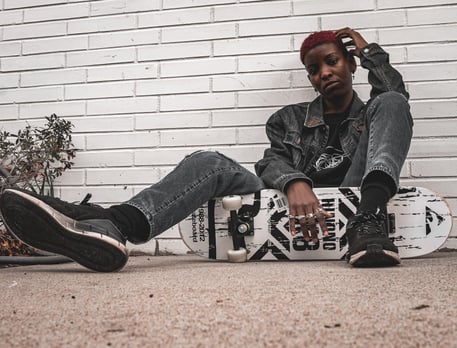
Q: What were some of the challenges you faced as a teenager in relation to your LGBTQIA+ identity?
“I believe I was lucky growing up because playing sports gave me an outlet and it allowed me to make friends that had a common bond. Several of [my] teammates were a part of the community and we had each other. We had our own small community within the community.” -Melba
“I was also deeply religious, so ages 12 to 16 were a bit torturous. I had gotten anointed with oil and prayed over to get “delivered” from homosexuality. This religious ritual did not work.” – L. Michael
“I did not quite reconcile with my sexuality during my teen years because I was not ready to embrace my truth due to the possible public admonishment. I attempted to mask my sexuality by exuding toxic masculinity traits. My attempt at trying to hide my sexuality only caused me to experience a self-esteem deficit.” – Amhir
Q: How did you navigate coming out (if you have) to friends and family? What was their reaction and how did it affect you?
“When I was 18, my mom actually dug through my trash can in my room, and found out through notes I was writing to my only gay friend. She was/is a devout Catholic, and told me it was just a phase I would grow out of (I haven’t). I grew distant from my mom for a long time because of the way she felt about my queer identity; I didn’t feel I could authentically share about myself or my relationships and the people I loved with her. I am very glad that I was already 18 and about to leave home by the time she found out…” -L.S. Pearce
“Luckily I had friends who were going through the same thing so the friend part was easy. My oldest sister helped me come out to my family. My other sister was also coming out of the closet around the same time.” -Katrina
“I told my aunt first and we three-way called my mom. My mom’s reaction was a bit off but understanding.” – Danni Jo
Q: What resources or supportive individuals/groups helped you during your teenage years?
“I had some peer support, but was largely on my own until I met my mentors at age 18…They course corrected my life and path, and I ended up moving to Washington, DC and starting over with college and professional life. I ended up making new friends who were like family…” – L. Michael
“I started therapy within school they had group meetings for lgbtq+.” – Danni Jo
“I had a good group of friends, and spent a lot of time in nature, or listening to punk/grunge music that was considered rebellious at the time. I had to learn to be comfortable swimming against the current!“ – L.S. Pearce
Q: If you could give one piece of advice to your teenage self, what would it be?
“The one piece of advice I would give is be true to yourself and don’t try to please everyone. Understand that everyone is not going to be accepting and understanding but don’t change for anyone, because you would be the one suffering.” – Melba
“It’s ok to be true to yourself. Love yourself for who you are. People don’t have to accept you but you have to accept you. They will come around and can kick rocks.” – Katrina
“Be brave and stand within your truth. The truth is the safest ground that you can stand upon. By embracing who you are and your truth, it may be difficult at first, but it will prevent you from hurting others with your actions as an attempt to hide who you are, and it may make you subsequently happier and freer earlier in life.” – Amhir
“Surviving something is not the same as healing from it. Get some therapy as soon as you can. Also believe people when they show you who they are the first time; don’t make excuses for what you see and hear with your own two eyes and ears.” – L. Michael
Q: How has your identity shaped your adult life and your personal relationships?
“It has made me more empathetic to the plight of people not my own and helped me recognize the common issues of all oppressed people. As for my personal relationships, it’s helped me to extend more grace and mercy than shame and judgment.” – L. Michael
“It has helped me with my confidence and how I approach things in life. I’ve learned through this that I have to be happy for me and not do things to please others.” – Katrina
“Being lesbian, genderqueer, a woman, and multiracial has given me a really strong understanding of intersectionality which has definitely impacted who I am as an adult. I think it has given me a lot of empathy for others and it has certainly provided me with a professional path that centers on helping other marginalized folks navigate the drama in their lives!” – L.S. Pearce
“…understand that sexuality is on a spectrum. Nothing is ever black and white, and it’s ok if you fall all the way to the left, or right or somewhere in the middle. Also, surround yourself with people that love and support you through all life’s changes.” – Anonymous
Q: Did you face any bullying or discrimination as a teen because of your identity? How did you handle it?
“Occasionally I was called names growing up, dike mostly because that was what people thought was the most like to offend you. Sometimes, it would hurt my feelings, but for the most part I didn’t let people I didn’t know get to me.” – Melba
“Yes, but more so in middle school/junior high than in high school. By 16, I wasn’t being bullied by anyone. I didn’t handle it well. I allowed my fear of being harmed to supersede properly defending myself. I always knew what I should have done after the fact rather than doing it in the moment. The only thing a bully respects is someone who won’t back down. I didn’t fully grasp that then, but I do now and defend myself accordingly as an adult.” -L. Michael
“When I realized I liked girls when I was 16, I told a friend who turned out to not be trustworthy, and I was outed at school. This was a very painful experience because in the 90’s, queer identities were viewed as deviant, perverted, and shameful, and I lost friends over it. People were calling me dirty names and queer slurs in the hallways of my high school, before I had ever even been in a queer relationship!” – L.S. Pearce
Q: What are some of the positive experiences or moments of acceptance you experienced as a teenager related to your identity?
“My sisters were extremely supportive. My oldest sister stood up for me more than I was able to Stand up for myself. It was because of her that I was able to be true to myself because I knew that she had my back. I never thanked her for that.” – Katrina
“It was great that I had a group of accepting friends who were all exploring different parts of their identities and were supportive of my own exploration. Almost all of those friends turned out to be straight, but they provided me with a safe space to explore my own unfolding identity without judgment.” – L.S. Pearce
“For better or worse, coming out at 16 gave me entry into a world of LGBTQ+ folks who helped not just keep me alive, but helped me thrive…They taught me family is not just about blood and community is what you are willing to build, develop, and nurture yourself without waiting on anyone else to make it happen.” – L. Michael
A Parent’s Role: Fostering Understanding and Acceptance for LGBTQIA+ Teens
The journey of parenting an LGBTQIA+ child is one filled with love, understanding, and constant learning. Here, we have compiled some advice and insights that could guide you in this journey.
An essential first step is to respond affirmatively and supportively when your child shares their identity with you. This unveiling of their selfhood, or coming out, is a significant moment. Acknowledge that gender identity isn’t mutable, but rather, it unravels over time as individuals explore and understand themselves better.
Your child’s identity should be met with acceptance and love. Strive to comprehend their emotions and experiences. Even in the face of disagreements, your child will rely on your support and validation for their healthy growth and self-confidence.
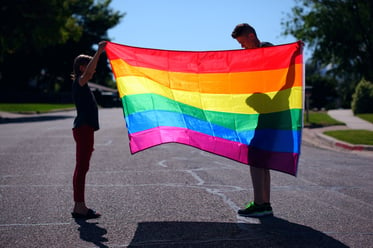
Be their advocate when they face unfair treatment or bullying. Be attentive to the societal pressures they may experience and use your resources to help them navigate such challenges. At the same time, instill a culture of respect and intolerance for slurs or jokes targeting gender, gender identity, or sexual orientation.
Keep an eye out for potential signs of mental health concerns such as anxiety, insecurity, depression, or low self-esteem. Timely intervention can make a significant difference, not only to your child but also to others in your community who might lack adequate support.
Bolster your child’s sense of community by connecting them with LGBTQIA+ organizations, resources, and events. It’s important for them to know that they are not alone and that there’s a welcoming community that understands their experiences.
Promote an environment that celebrates diversity. Introduce your child to a variety of books, movies, and materials that provide positive representation of gender diversity. Point out LGBTQIA+ celebrities and role models who advocate for the community and embody bravery against societal stigmas.
Encourage your child’s self-expression in every aspect of their life, from their clothing and jewelry to their choice of friends and room decorations. Such open conversations can enhance their confidence and individuality.
Lastly, should you feel the need for further education or support to deepen your understanding of LGBTQIA+ youth experiences, don’t hesitate to reach out to your community.
Conclusion
As we draw the curtains on Pride Month, the narratives shared by our LGBTQIA+ community members reaffirm the importance of inclusivity, understanding, and support. These stories serve not just as a beacon of hope for teens grappling with their identities, but they also remind us of the crucial role we have as parents, siblings, friends, educators, and allies in shaping a safe and accepting environment.
The LGBTQIA+ community is a tapestry of diverse identities, experiences, and journeys, each with its own challenges and triumphs. The courage to embrace these identities, to stand up against discrimination, and to voice their truths, is an inherent part of the narrative. We hope the shared stories in this post resonate, educate, and inspire our readers, creating a ripple of understanding that eventually leads to acceptance and celebration.
For parents of LGBTQIA+ youth, your unwavering love, acceptance, and support can create a haven for your children. Let’s cultivate a world that is not just tolerant, but affirming, of diversity in all its forms. Encourage your children’s self-expression, help them navigate social pressures, and most importantly, celebrate their unique identity. Because a world in which we acknowledge, respect, and champion diversity is a world where everyone truly belongs.
Let’s remember that Pride does not end with June. It’s a year-round commitment, a constant endeavor to uphold the dignity, rights, and well-being of our LGBTQIA+ community. This Pride Month, let’s celebrate the strength, resilience, and diversity of our community and carry these narratives forward, beyond the rainbow hues of June, and into every day of our lives.
Thank you for joining us on this journey. Here at Merida Teens Club, we reaffirm our commitment to creating a supportive and welcoming space for all. We look forward to your continued support as we stride towards a future that recognizes and celebrates all identities, echoing the true spirit of Pride, every day.
Resources
1. The Trevor Project – provides crisis intervention and suicide prevention services to lesbian, gay, bisexual, transgender, queer & questioning (LGBTQ) young people under 25.
2. GLSEN – Gay, Lesbian & Straight Education Network is an organization working to create safe and inclusive K-12 schools for LGBTQ+ students. They provide resources for educators, students, and parents.
3. PFLAG – Parents, Families, and Friends of Lesbians and Gays provides support, education, and advocacy resources for LGBTQ+ individuals and their parents, families, and allies.
4. It Gets Better Project – a nonprofit organization with a mission to uplift, empower, and connect lesbian, gay, bisexual, transgender, and queer youth around the globe. It has a variety of personal stories shared by individuals from the LGBTQ+ community.
5. Gender Spectrum – a useful resource providing support for young people, families and professionals on matters of gender identity and gender expression.
6. Human Rights Campaign (HRC) – empowers young activists to get involved in their communities, advocating for LGBTQ+ equality.

.png?width=50&name=JLawal%20-%20Paris%20(1).png) By
By
